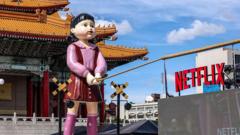In an extraordinary turn of events, Bolivia’s recent elections signal a departure from leftist leadership, setting the stage for a run-off between Rodrigo Paz Pereira and Jorge Quiroga, presenting a potential new direction for the nation.
Bolivia on the Brink of Historic Political Shift as Non-Left Candidate Emerges Victorious

Bolivia on the Brink of Historic Political Shift as Non-Left Candidate Emerges Victorious
Bolivia may see a fundamental change in governance following nearly twenty years of socialist rule, as preliminary results suggest a shift to the right amid an economic crisis.
In a dramatic electoral landscape, Bolivia appears poised to elect its first non-left wing president in nearly two decades. Early unofficial results from Sunday’s presidential elections indicate that senator Rodrigo Paz Pereira is leading the race, followed closely by former president Jorge Quiroga, necessitating a run-off between the two candidates set for October. The current socialist party's hold on power seems precarious as neither candidate achieved an outright victory, underscoring a palpable desire for change among the electorate.
Paz Pereira, affiliated with the Christian Democratic Party, has rallied a surprising following with a campaign centered on redistributing financial resources to regional governments and tackling corruption, coining the slogan "capitalism for all, not just a few." His policies aim to provide accessible credit, tax incentives for formal businesses, and the reduction of import barriers on products that Bolivia currently imports.
Quiroga, who served both as the interim president and Vice President in the early 2000s, represents an era of right-leaning governance that may shift Bolivia’s foreign relations, particularly in view of its valuable lithium reserves crucial for the renewable energy sector. A shift in leadership could very well signal an enhancement of ties with the United States, turning away from the past two decades of closer relations with China, Russia, and Iran.
Bolivia stands at a critical juncture, grappling with its worst economic conditions in years, plagued by fuel shortages, inflation, and considerable debt. Opinion polls suggest a significant number of voters leaned toward alternative choices to express discontent with the incumbent Movimiento al Socialismo (MAS) party. The current president, Luis Arce, who has struggled with lasting unpopularity, opted not to seek re-election, with the MAS party facing escalating public displeasure.
The scene at voting stations reflected this growing sentiment, with reports indicating physical confrontations against MAS candidates; Eduardo del Castillo encountered hostility when he attempted to vote, and tensions escalated further with an explosive device detonated at a polling station frequented by candidate Andrónico Rodríguez, a former MAS member now at odds with the party.
The absence of prominent figure Evo Morales from the ballot has marked a significant moment in Bolivian politics. Despite being barred from running, Morales continues to wield influence among his supporters. His call to nullify votes indicates the severity of divide within leftist factions, exacerbating internal strife. Voting irregularities marred the last election held in 2019, prompting nationwide protests and ultimately the resignation of Morales amid military pressure.
As Bolivia prepares for the forthcoming run-off election, the stakes have never been higher, determining not just leadership but the strategic direction of the country amidst complex socio-economic challenges.


















